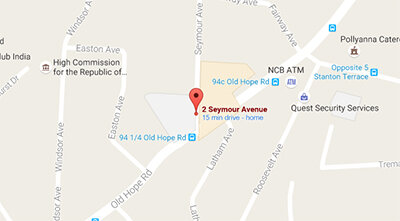Best Wage & Hour Lawyers in Jamaica
Share your needs with us, get contacted by law firms.
Free. Takes 2 min.
Or refine your search by selecting a city:
List of the best lawyers in Jamaica
About Wage & Hour Law in Jamaica
Wage & Hour Law in Jamaica is designed to ensure that employees are compensated fairly for their work and that employers comply with standards regarding work hours and remuneration. Key legislation includes the Employment (Termination and Redundancy Payments) Act, Minimum Wage Act, and the Holidays with Pay Act, which collectively regulate matters such as minimum wage rates, termination, redundancy payments, and mandatory time off. These laws aim to protect workers from exploitation and ensure equitable treatment across various employment sectors.
Why You May Need a Lawyer
There are several situations where individuals might seek legal advice regarding Wage & Hour issues in Jamaica. These include disputes over unpaid overtime, discrepancies in wage payments, wrongful termination involving wage issues, entitlement to holiday or sick pay, and understanding one's rights under employment laws, particularly if the employer does not adhere to statutory labor laws. A lawyer specializing in this field can provide guidance, help resolve disputes, and ensure fair treatment under the law.
Local Laws Overview
Jamaica's labor laws encompass several significant aspects pertinent to Wage & Hour concerns:
- Minimum Wage: The Minimum Wage Act establishes the statutory minimum wage that must be paid to workers, ensuring a baseline remuneration for labor across sectors.
- Work Hours: Standard work hours are generally capped at 40 hours per week, with overtime normally compensated at a higher rate as agreed or mandated by industry-specific provisions.
- Overtime and Holidays: Employees are entitled to specific overtime pay rates, and the Holidays with Pay Act outlines mandatory leave days and compensation during public holidays.
- Termination and Redundancy: Governed by the Employment (Termination and Redundancy Payments) Act, employees are entitled to notice and compensation under particular conditions such as redundancies or unfair termination.
- Sick Leave and Maternity Leave: Employees are entitled to sick leave and maternity leave benefits as stipulated under relevant labor laws.
Frequently Asked Questions
What is the current minimum wage in Jamaica?
The current minimum wage in Jamaica is subject to periodic review and changes. It is essential for workers to stay updated on the latest rates as prescribed by the Ministry of Labour and Social Security.
How are overtime wages calculated?
In Jamaica, overtime is typically calculated at one and a half times the regular hourly rate. However, specific contracts or agreements may outline different proportions, so always refer to the employment agreement.
Am I entitled to pay on public holidays?
Yes, if you are scheduled to work on public holidays, you are generally entitled to receive double your standard wage for those hours worked.
What is considered unfair dismissal?
Unfair dismissal occurs when an employee is terminated without just cause or without following the proper procedures as mandated under Jamaican labor laws. This may include wrongful termination without notice or redundant dismissals not in adherence to contractual agreements.
How can I resolve a wage dispute with my employer?
Initially, it is advisable to try and resolve the issue internally with your employer. If unsuccessful, filing a complaint with the Ministry of Labour and Social Security or consulting with a legal professional may be necessary.
Are part-time employees entitled to the same benefits as full-time employees?
Part-time employees usually receive proportional benefits based on their working hours unless their contract states otherwise. However, all employees must receive at least the minimum statutory benefits.
Is there a legal requirement for sick leave in Jamaica?
Yes, workers are entitled to sick leave, although the exact terms can vary based on employment contracts and sector-specific regulations.
How is redundancy pay calculated?
Redundancy payment calculations take into account the employee's tenure, age, and wage, alongside other factors as outlined in employment legislation.
Can an employer deduct wages for damaged goods?
Employers must have the employee's written consent to make any deductions for damaged goods out of the employee's salary, and even then, it should comply with legal stipulations.
What steps should I take if my employer does not pay the minimum wage?
If your employer fails to pay the minimum wage, you should file a complaint with the Ministry of Labour and Social Security and consider consulting a legal professional for further action.
Additional Resources
For further information and assistance, the following resources may be helpful:
- Ministry of Labour and Social Security: Provides official guidelines, receives complaints, and offers mediation services for labor disputes.
- Jamaica Employers' Federation: Offers support to employers in understanding labor laws and best practices.
- Trade Unions: Can offer representation and advice regarding employment rights and disputes.
- Legal Aid Council: Provides legal assistance and representation to those who qualify.
Next Steps
If you believe you need legal assistance regarding Wage & Hour issues, the following steps are recommended:
- Document all relevant information and correspondence related to your issue, including contracts, pay slips, and communication with your employer.
- Consult with a lawyer who specializes in employment law to obtain professional advice tailored to your specific situation.
- Consider alternatives such as mediation or arbitration if legally applicable, to potentially resolve issues more amicably and efficiently.
- If you pursue legal action, ensure that you have all necessary documentation and that your case is well-prepared with the assistance of your legal counsel.
Lawzana helps you find the best lawyers and law firms in Jamaica through a curated and pre-screened list of qualified legal professionals. Our platform offers rankings and detailed profiles of attorneys and law firms, allowing you to compare based on practice areas, including Wage & Hour, experience, and client feedback.
Each profile includes a description of the firm's areas of practice, client reviews, team members and partners, year of establishment, spoken languages, office locations, contact information, social media presence, and any published articles or resources. Most firms on our platform speak English and are experienced in both local and international legal matters.
Get a quote from top-rated law firms in Jamaica — quickly, securely, and without unnecessary hassle.
Disclaimer:
The information provided on this page is for general informational purposes only and does not constitute legal advice. While we strive to ensure the accuracy and relevance of the content, legal information may change over time, and interpretations of the law can vary. You should always consult with a qualified legal professional for advice specific to your situation.
We disclaim all liability for actions taken or not taken based on the content of this page. If you believe any information is incorrect or outdated, please contact us, and we will review and update it where appropriate.
Browse wage & hour law firms by city in Jamaica
Refine your search by selecting a city.
















